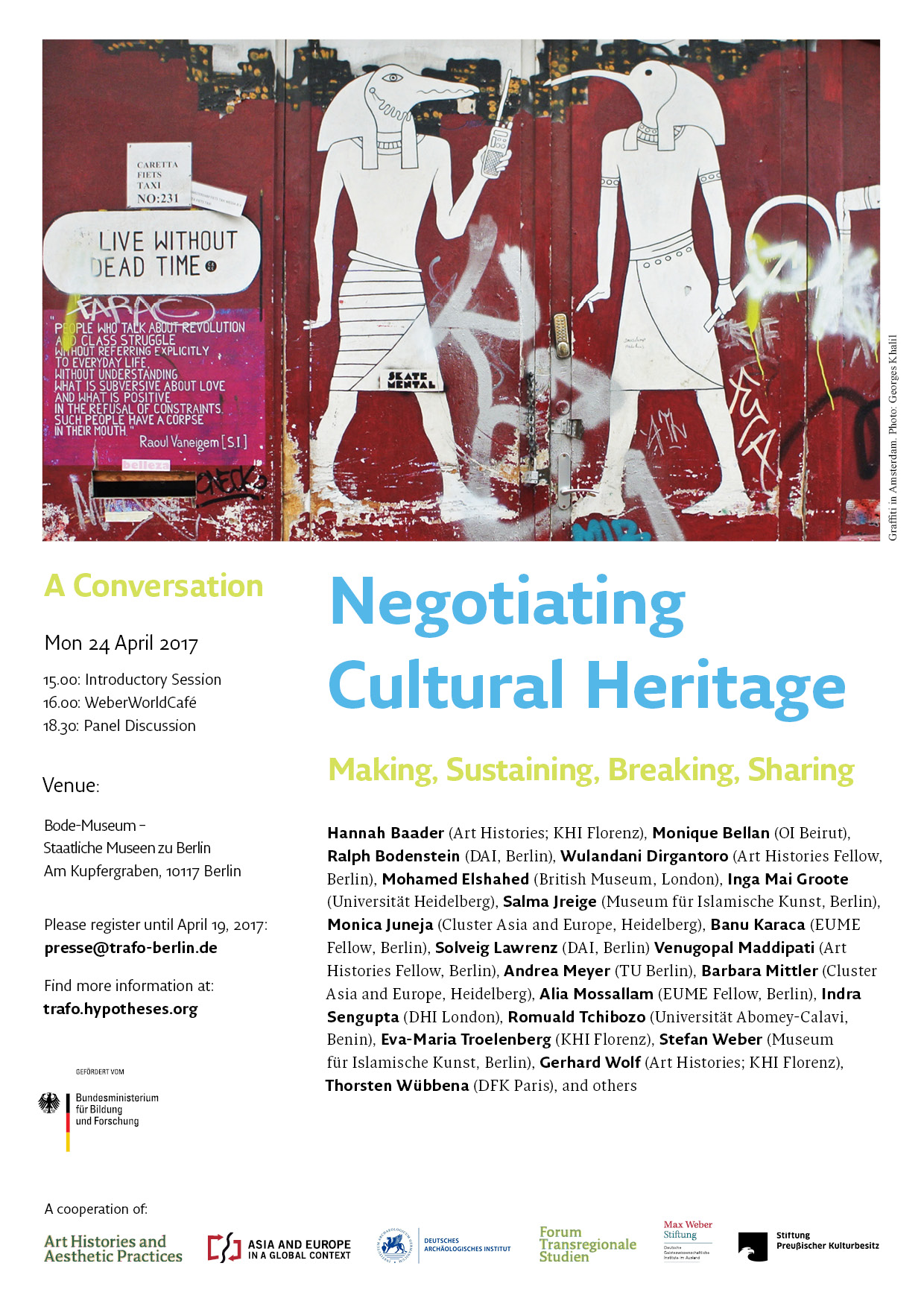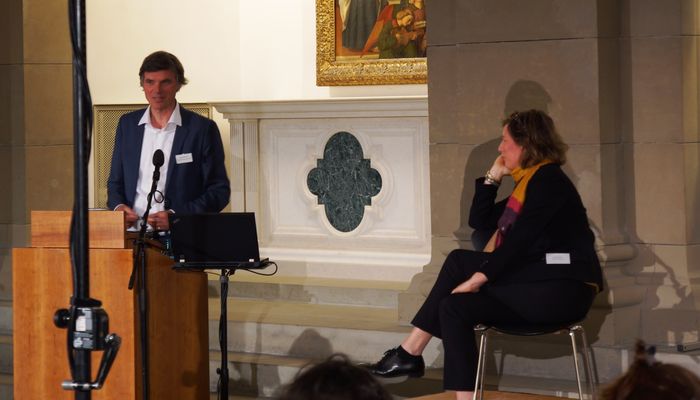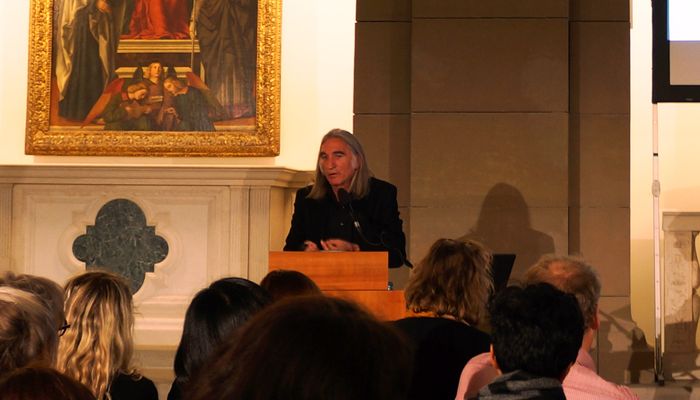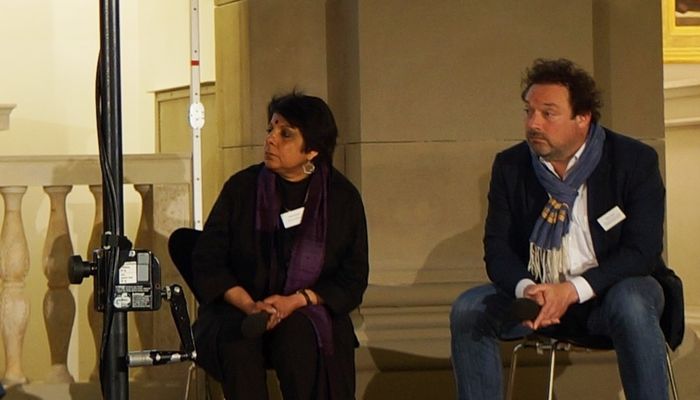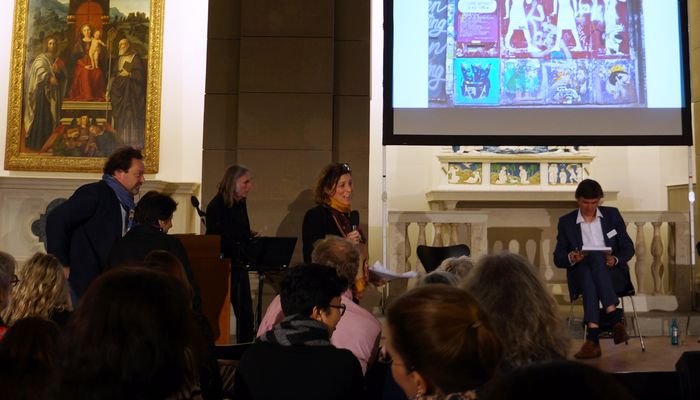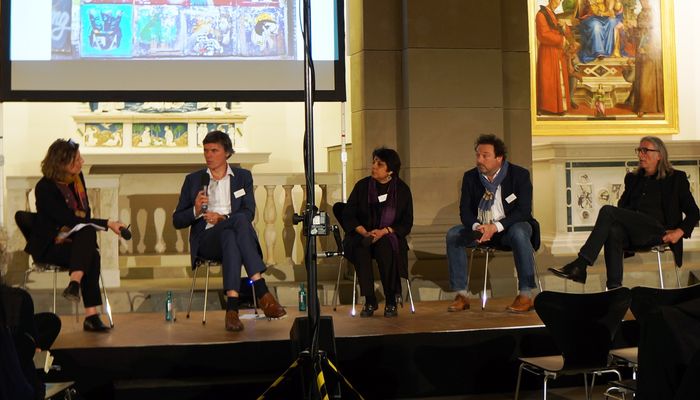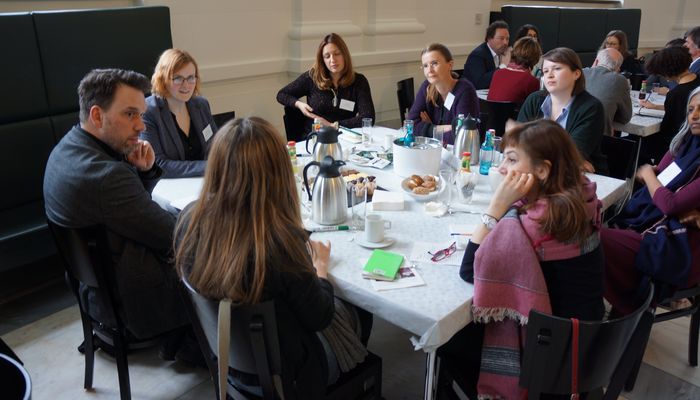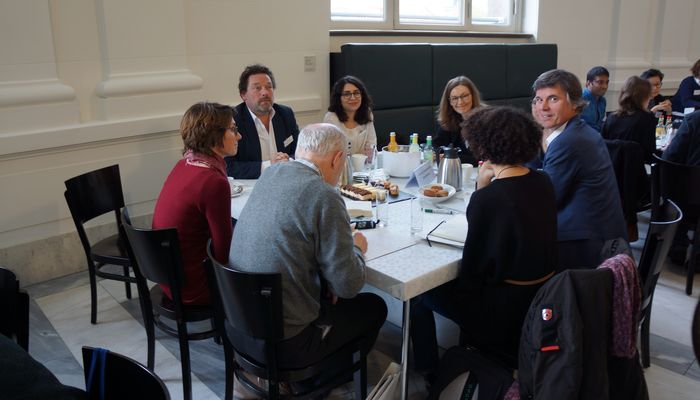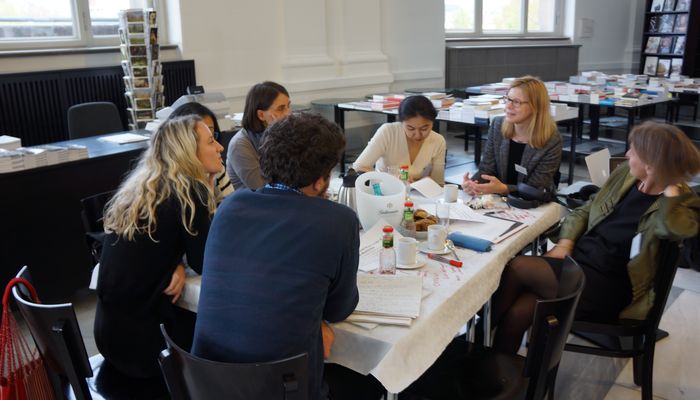Poster
Blog report
Panel Discussion
Welcome and Introduction Prof. Barbara Mittler
Architecture, artworks, crafted objects, texts, music, as well as sites, places, sounds and tastes are cultural products that can contribute to a sense of community, belonging and identity. Objects of the past are deemed worthy to be stolen and reclaimed, to be exhibited and reconstructed, to be researched and collected, or even to be destroyed. As such, cultural goods or “things” are reference points for narratives of heritage and community. They are protected by international conventions; simultaneously, they are instruments of communitarian or even national politics which might be claimed by different communities or actors. Hence, cultural heritage is a concept of complex negotiations that is not devoid of conflict.
Negotiating Cultural Heritage: Making, Sustaining, Breaking, Sharing
A cooperation between Art Histories and Aesthetic Practices, Cluster of Excellence “Asia and Europe in a Global Context”, Deutsches Archäologisches Institut, Forum Transregionale Studien, Max Weber Stiftung and Stiftung Preußischer Kulturbesitz
Bode-Museum, Am Kupfergraben, 10117 Berlin
In Syria and Iraq, buildings and even entire historical cities playing a central role in terms of cultural heritage are being destroyed, while in other places cultural goods and sites are rebuilt, restored, and, in that way, altered. Museums and other institutions act as keepers or “care-takers” of heritage objects; although archives of cultural heritage can also be non-institutional. More recently, the concept of “shared heritage” has become crucial, though not unquestioned.
Drawing on the discussions of the conference “Making, Sustaining, Breaking: The Politics of Heritage and Culture” that took place in October 2016 in Heidelberg, we want to debate the following questions”: What does cultural heritage mean in different national and regional contexts? Who can claim it as theirs, and who decides what constitutes cultural heritage, decides how it is preserved, displayed, or restored? Should museums and other cultural institutions act as preservationists, explorers, or mediators of this heritage? How do archeological institutions that excavate and research figure in this scenario? Can their work and the practices of museums relating to cultural heritage be “decolonized”? Which other forms of cultural heritage could be included in museal representations and archaeological practices? In the 21st century, could digitalization allow us to sustain cultural goods, make them more accessible and guarantee their long-term preservation? How to share cultural heritage?
Based on examples, insights and experiences from different contexts we want to continue the conversation on cultural heritage between preservation and destruction, between ideologization and reconstruction from different institutional, disciplinary and regional perspectives.
The conversation is arranged by a cooperation of the research program Art Histories and Aesthetic Practices, the Cluster of Excellence Asia and Europe in a Global Context, the Deutsches Archäologisches Institut, the Forum Transregionale Studien, the Max Weber Stiftung and the Stiftung Preußischer Kulturbesitz.
Program
Monday, 24 April 2017
Bode-Museum, Staatliche Museen zu Berlin
Am Kupfergraben, 10117 Berlin
15:00 Introductory Session (Basilika)
Welcome and Introduction:
Representative N. N. (Stiftung Preußischer Kulturbesitz)
Barbara Mittler (Cluster Asia and Europe/Forum Transregionale Studien)
Hannah Baader (KHI Florenz/Art Histories)
16:00 WeberWorldCafé (Museum Café)
Introduction: Johanna de Schmidt (Max Weber Stiftung, Bonn
Table 1: Cultural Heritage, Trauma, and Manipulation
Wulandani Dirgantoro (Art Histories Fellow, Berlin)
Venugopal Maddipati (Art Histories Fellow, Berlin)
Table 2: Art and Culture Re-oriented
Monique Bellan (OI Beirut)
Mohamed Elshahed (British Museum, London)
Table 3: Museums. A Cultural Institution and its Critique
Andrea Meyer (TU Berlin)
Eva-Maria Troelenberg (KHI Florenz)
Table 4: Museums, Immigration and Interculturalism
Stefan Weber (Museum für Islamische Kunst, Berlin)
Salma Jreige (Museum für Islamische Kunst, Berlin)
Table 5: Digitizing Cultural Heritage
Solveig Lawrenz (DAI, Berlin)
Thorsten Wübbena (DFK Paris)
Table 6: Heritage and the Legacies of Empire and Nation
Indra Sengupta (GHI London)
Banu Karaca (EUME-Fellow, Berlin)
Table 7: Cultural Heritage and Popular Histories
Alia Mossallam (EUME-Fellow, Berlin)
Table 8: Shared Heritage and Community-based Initiatives
Romuald Tchibozo (University of Abomey-Calavi, Cotonou/Benin)
Table 9: Western Classical Music and Asian Musicians – Crisis, Challenge, Chance
Inga Mai Groote (Universität Heidelberg)
Barbara Mittler (Cluster Asia and Europe, Heidelberg)
18:00 Break
18:30 Panel Discussion (Basilika)
Ralph Bodenstein (DAI, Berlin)
Monica Juneja (Cluster Asia and Europe, Heidelberg)
Stefan Weber (Museum für Islamische Kunst, Berlin)
Gerhard Wolf (KHI Florenz/Art Histories, Berlin)
Chair: Hannah Baader (KHI Florenz/Art Histories, Berlin)
19:30 Reception (Basilika)

